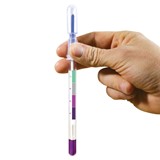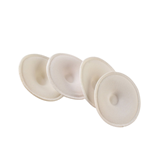The national research collaboration has also devised a new antibody that can identify the protein and measure its presence in breast cancer tissue.
The protein, inositol polyphosphate 4-phosphatase-II (INPP4B) has been known to exist in breast cancer tissue, but Dr Fedele and the team discovered that the levels of this protein in tumours may be important in determining the severity of the disease. "We looked at a specific subtype of aggressive breast cancer and found that in about 90 per cent of these types of almost untreatable tumours, INPP4B was gone," Dr Fedele said.
"This particular subtype of aggressive tumour doesn't usually respond to treatments such as Tamoxifin. But knowing the correlation between the amount of INPP4B protein and the cancer means we can at least consider treatment alternatives."
Dr Fedele, who undertook these studies as part of her PhD, said unfortunately treatment options were not as simple as increasing the protein. "Recreating proteins is scientifically still a little way off. But we are a step closer to identifying how drugs could be designed to specifically target the pathway that is controlled by INPP4B," Dr Fedele said.
"Understanding why some breast cancers are more aggressive than others will help us develop more effective and personalised treatments in the future."
Fedele said the challenge for the research team was to also develop a technology which easily detects and measures the protein and ideally, could be incorporated into existing pathology testing processes. "We created an antibody to INPP4B, which works by specifically detecting the protein in biopsies from breast cancer patient samples."
The laboratory testing was carried out on almost 400 human breast cancer tissue samples and has taken over four years to complete.
The research results will be published in the prestigious PNAS journal.
The research project was conducted at Monash University's Biomedical Sciences Precinct at the Clayton campus and was supported by the National Health and Medical Research Council and the Cancer Council Victoria.
The research collaboration also included work from the Head of the Pathology Board at Monash University and director of Anatomical Pathology at The Alfred Hospital, Prof Catriona McLean, and research teams from the Cancer Council Victoria and The Garvan Institute of Medical Research in Sydney.
Dr Fedele said to achieve such a research breakthrough within the confines of her PhD is a wonderful start to her research career. "So many people have contributed to the research; it's never just one person. But in the end it's about achieving outcomes, which are relevant at a community level and that's been a really positive result for us," Dr Fedele said.








-160x160-state_article-rel-cat.jpg)